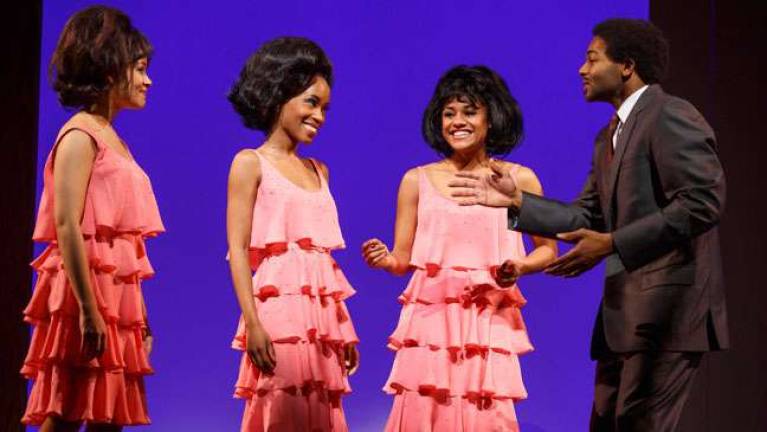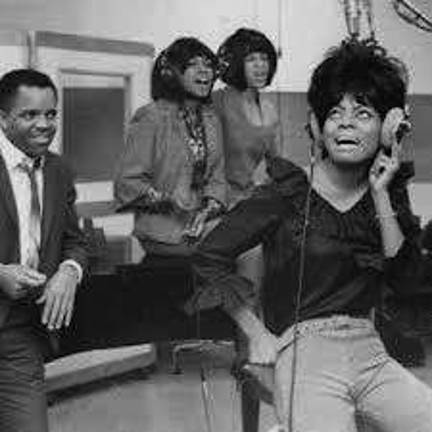A Legacy Is Born


Broadway's Motown means more than it can say
Barry Gordy, founder of the legendary record label Motown had to do something. His landmark artistic venture had some of its historic stature stolen by the lame-brain drama and trifling music of Dreamgirls (which traduced the story of Motown group The Supremes for a cliché-ridden yet widely-promoted melodrama. Gordy had to correct that defamation by telling his own story, co-producing and writing the book for Motown: The Musical Motown-an authorized account of how he initiated the record label, thus revolutionizing popular culture.
Because envy has always motivated Gordy's emulation of established showbiz forms and inspired him to elevate them, Motown: The Musical is not as original as it ought to be. Each Motown hit, (at least one of them-from Barrett Strong's "Money" to Stevie Wonder's "Living For the City"-is in the heart of every pop-loving Earth-dweller), tells a story of romantic ambition and social reportage. Their lyric stories would make imaginative Broadway plots, yet Gordy imitates recent jukebox musical formula. His show is like a Las Vegas review of popular hits performed by talented impersonators.
It could have been more. Gordy's personal story of following Joe Louis' heavyweight boxing championship that meant so much to aspiring African Americans and all desperate WWII-era Americans combined in a rarely explicated achievement of Black intelligence and ambition. Gordy's history encompasses the story of the Great Migration when Southern Blacks came North for opportunities like Detroit's auto industry and forged ahead romantically, intellectually, professionally. Using his boxer's nerve and family financing, Gordy idealized the family model to build an artistic salon that to this day is American pop's only rival to the fabled glories of Hollywood. MGM Studios boasted having "more stars than there are in the heavens" and Gordy's stable of writers, musicians, producers and performers held equal magnitude. At one brief, fascinating point in the show Gordy laments his protégés' ingratitude saying "Stars I polished are now in orbit." (His lyricist gift still intact.)
Recalling the Gilbert and Sullivan line "We really know our worth the Sun and I," Gordy makes his Broadway debut by treating Motown's history like looking through a telescope at celestial constellations. Compressing Gordy's personal family story and his professional family story, (with special emphasis on his Svengali relationship with Diana Ross), director Charles Randolph-Wright makes the drama skyrocket from success to success to the corporation's eventual crash--always moving too fast to bore.
Motown: The Musical begins with a medley of hits that bursts the bounds of Broadway musical tradition. It is both ecstatic and ironic. Taken from the opening performance of the 1984 TV special "Motown: 25," this recreation of the sing-off between new-and-surviving members of The Temptations and The Four Tops isn't so much a competition as a tandem exhibition like jet pilots flying in formation-it soars and soars. In contemporary musical terms it's called a mash-up but the quieter customs of Broadway know no equivalent for the simultaneous jubilant and nostalgic effect it creates.
This mash-up of love-pledges, torch songs, dance themes and romantic anthems immediately demonstrates the great range of Black American feelings, thought and language that our mainstream culture still has not adequately understood.
Motown-an icon and mantra as much as a historic cultural entity?represents that widest possibilities of knowledge and expression. This is something that most cultural critics are still reluctant to confer upon Motown's neo-soul sound. Because Motown represented the aspirations and fluency of upwardly-mobile Black people, it is too often deemed inauthentic to those who prefer circumscribing Black folks to the gut-bucket stereotypes of uneducated Southerners who don't command the English language, who sing and play music greatly, though without refinement-that, without demonstrating the smooth mastery of Western art tropes that Motown, (the ultimate symbol of Civil Rights Era progress), apprehended and transformed.
The new language of American success that Motown sang demands a more innovative show than this. (The potential is apparent when the sublime "I Hear a Symphony" underscores a less-than-perfect love scene.) I wanted something tougher like the way Gordy's signature tune "Money" was used in the film Killing Them Softly in order to combat the lies of the dreadful Dreamgirls and reclaim the legacy that had been cheapened, (even by the excellent Sparkle). Something that explained Gordy and Ross intimately referring to each as "Black."
Instead, Motown: The Musical settles for the pleasure of watching Brandon Victor Dixon (Gordy), Valisia LeKae (Diana), Charl Brown (Smokey Robinson) and Bryan Terrell Clark (Marvin Gaye) act out biographies that musically-emotionally belong to all of us. Has any talented performer ever wanted success as nakedly as Diana Ross? LeKae's caricature is all smiles, exuberance, determination and captures the sweetest, most underrated voice in pop music history.
Each performer is uncannily right and the way audiences cheer the idea of Michael Jackson testifies to Motown's great significance. You'll have to read the various Motown autobiographies to feel the details-or just go back to the records.
Follow Armond White on Twitter at 3xchair